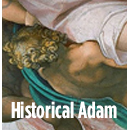Did Adam and Eve really exist? Did God really make the first man out of dust and then create the first woman from his rib? Did the first human pair really live in Paradise, the Garden of Eden, a few thousand years ago, somewhere near present-day Iraq? Did two magical trees really grow in this Garden? Did a talking snake really trick Adam and Eve into disobeying God’s command not to eat the “evil” fruit of knowledge? Is that how we humans became mortal, and all evils came into in the world? Is that really how the story of the world began?
Many of us will instantly say, “of course not.” Without thinking, we recognize the story as a tale, a myth, saga, or a legend, and as nothing like a simple factual report of events (the cunning super-creature is but one clue). But even if not, anyone who has gotten through middle-school geology and world history knows that those things never happened. Learned people have known since the 18th century that the earth and its species had a long pre-human past, that violence and death existed millions of years before humans did, and that human history didn’t begin in Mesopotamia, but most likely in Africa instead. Furthermore, in high school biology we learned that modern humans did not appear instantly, but evolved over time, that we came from a common ancestor with chimps, not from dust, and that the current human population could not have come from a single original pair—observable genetic diversity makes that impossible.
In other words, many of us think that to read the Adam and Eve story as a simple record of events displays woeful insensitivity to the literary character of the text, and worse, it makes the story a sitting duck—any schoolboy (or schoolgirl) can prove the story absurd by using basic science. (And they are doing so in droves as they wave “so long” to evangelical churches.)
But despite this disaster, millions of Christians persist in taking the story of Adam and Eve as a literal record of events. Why? Why do preachers and college presidents passionately proclaim from the rooftops that unless we take the story as a literal history the Bible is discredited, faith is undermined, and all is lost?
Why they do so is a bit complicated, a matter of “hermeneutics,” the rules of biblical interpretation that they employ. The main two: “inerrancy,” i.e., the Bible has no factual errors; and “simplicity,” i.e., God always communicates in the simplest, clearest manner possible. On those assumptions—“inerrancy” and literal “simplicity”—we are obliged to see the story as a simple literal report of events. This is God’s report, so it trumps anything that anyone else thinks or says, no matter what arguments or evidence they give. Taking Adam and Eve and all the rest as literal history isn’t a matter of opinion; it’s a divine command! So then what?
First, if we are wise, we will think long and hard about those hermeneutical assumptions, especially since they lead us into an extremely dangerous state of affairs. Here is what it looks like to those of us who think the assumptions are mistaken: sincere Christians are fighting to the death to make embarrassing falsehoods fundamental to Christian faith! What could be better for atheists, or worse for the Christian cause? The irony is that it is that literal Adam and Eve are discrediting the Bible and causing faith to be undermined. It is time for Christian leaders to take a breath, to stop this misguided, self-destructive—and faith-destructive—behavior, and to listen to the wisest and best scholars in their midst (the ones they haven’t fired yet, or driven off!) What are these scholars saying? Mainly, two things.
(1) They say it is urgent for Christians to gain literacy in science so far as they can. Somehow we educators must counteract the terrible ignorance and misinformation currently gushing out of anti-evolutionary creationist propaganda mills. Reliable educational resources are easily available, but courage to use them is not. Somehow, the fear that pro-evolution sources are anti-Christian has to be overcome.
(2) The scholars say that to overcome these fears people need to be introduced to established scholarship on Genesis, so that they can “see” the creation story in its own original ancient terms. Scholars have been doing this since the mid-19th century. Outside America, most evangelical Christians have gotten on board and it has freed them to embrace science. Unfortunately, American evangelical gatekeepers have “protected” ordinary believers from reaping the riches of this research. It’s a great shame.
If we read Genesis is in its own ancient terms, it becomes clear immediately that it is not a simple record of events, designed to arm us against Darwinism. The Genesis story is a complex text, with clear indications of its human antiquity (the earth is a flat disk sitting on primal “waters below” and covered by a hard shell that shields it from “waters above,” and it existed fully formed and flourishing with plants before God made the sun, moon, and stars—the physical universe!) The description obviously has no value to us as science.
But it sure does have value as a source of religion. The master key is light. In the myths of ancient Babylon (the enemy and captor of Israel, and obviously in the writer’s crosshairs), the sun, moon, and stars created light, and so the Babylonians worshiped them as gods. The writer of Genesis 1 rudely reconstructs this worldview: the creator of light is the Hebrew God, and the celestial “lights” (the Babylonian gods) are His creatures. They obey Him, and we humans are not to worship them, but the true God, who is in a religious class all by Himself. There are scores of eye-opening things that come out when we read Genesis in its own original historical and literary terms.
It is not hard to see that Adam (Mankind) and Eve (Our Mother) are (like the super-serpent) symbolic figures created in order to help us to see ourselves, to see our universal desire to be our own gods, and to recognize our need for the redemption offered by the Last Adam, Jesus Christ. Surely we need not think of Adam as a historical man in order to affirm Paul’s claim that all men and women have been disobedient and subject to sin and death from the beginning; and to see that hope of release from this bondage resides in the life, death, and resurrection of Christ (who obviously was a man, even if Adam was not).
This article is part of our Symposium on the Historical Adam:

John Schneider teaches philosophy at Grand Valley State University and is publishing actively on the implications of evolutionary science for Christian faith. Long a leading evangelical theologian, Professor Schneider taught at Calvin College for 25 years. He is the author of many papers and three books, including The Good of Affluence: Seeking God in a Culture of Wealth.










